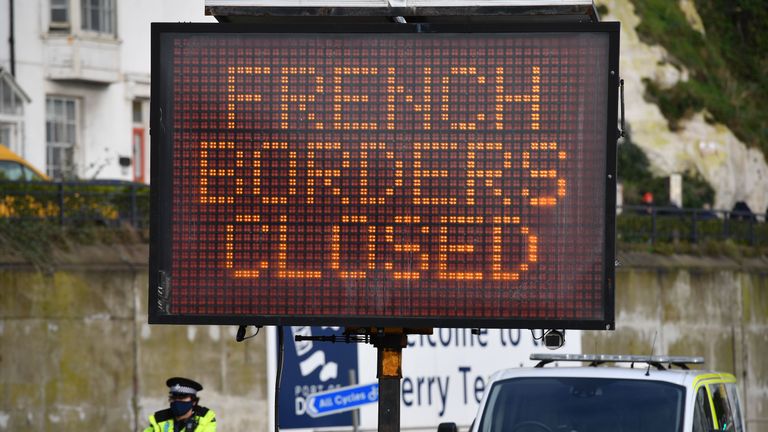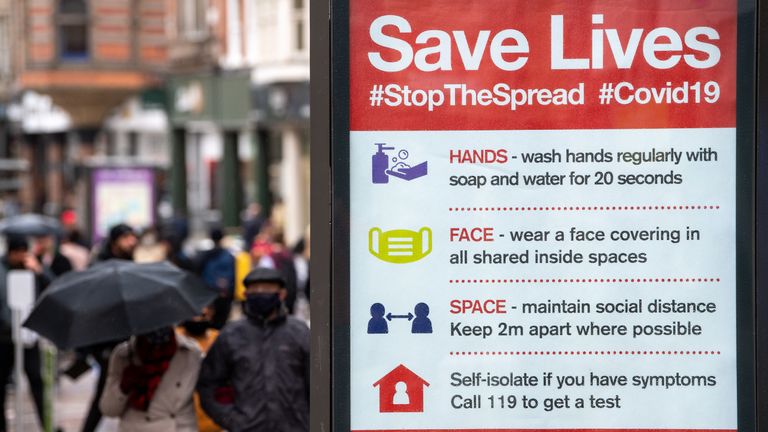COVID-19: Germany extends UK travel ban to 6 January – despite EU urging countries to lift restrictions
Germany has extended its ban on travellers arriving from the UK to 6 January, despite the EU telling countries to lift restrictions to allow essential journeys and minimise trade disruption.
“The German government has extended its ban on air passenger flights arriving from the UK to Germany to a ban on all forms of transport until Wednesday 6 January 2021,” the Foreign Office travel advice for the country states.
Latest coronavirus updates from the UK and around the world
“During this period, transport operators are banned from offering plane, bus, ferry and train journeys from the UK to Germany.
“From 1 January 2021, transport operators can apply to the German authorities for an exemption to transport individuals who are resident in Germany. Contact your transport operator for more information.”
Dozens of countries have blocked people arriving from Britain over fears about the new coronavirus variant that is said to be much more transmittable.
France went a step further by stopping lorry drivers in the UK taking their freight across the Channel, creating chaos on the approach to Dover.
But after talks between London and Paris, France announced that French and EU nationals and British residents in France will be allowed into the country from midnight – provided they can show a negative PCR test from the last three days.
However, Sky News understands the UK was pushing for rapid turnaround lateral flow tests being conducted on lorry drivers with the help of the military to be utilised.
These return results within 15 to 30 minutes, but PCR tests can take 24 hours to come back.
The French PM’s office said it will announce specific measures to resume trade and haulage from the UK to France “in the coming hours”.
Following talks earlier on Tuesday, the EU Commission said in a statement it was “important to take swift temporary precautionary action” to limit the spread of COVID-19.
But it added: “Flight and train bans should be discontinued given the need to ensure essential travel and avoid supply chain disruptions.”
The EU commissioner for justice, Didier Reynders, added that “blanket travel bans should not prevent thousands of EU and UK citizens from returning to their homes” in the run up to Christmas.
Within hours, Ireland announced it would defy the plea and keep up its travel ban on Britain until 31 December.
The coronavirus variation that has wreaked havoc is known as VUI-202012/01. It was found predominantly in London and southeast England.
But it has also been discovered in every region of England, Wales and Scotland, albeit in “very small numbers”.
Similar strains have been detected in Denmark and Australia, and there are other variants that look very similar detected in South Africa, the Netherlands and other countries, said Dr Susan Hopkins of Public Health England.
Ireland will introduce stricter restrictions from Christmas Eve because of fears the new variant is spreading there, Prime Minister Micheal Martin announced on Tuesday.
“We do not yet have evidence that the new, more virulent strain of the virus is in our country, but the rate of growth over the last week tells me that the safest, most responsible thing to do is to proceed on the assumption that it is already here,” he said.
But the boss of BioNTech, one of the firms behind the only coronavirus vaccine approved for use in the UK, said earlier he is confident the jab will be effective against the new variant.
Around 500,000 people in the UK have had the first shot of immunisation, but England could face another effective lockdown in the new year while the rollout continues.
Prime Minister Boris Johnson has voiced hopes that life will return to normal by Easter, marking a year since the first lockdown.
During the pandemic, 76,287 people in the UK have died with COVID-19 on their death certificates – one of the highest death tolls in the world.
Source: Read Full Article





